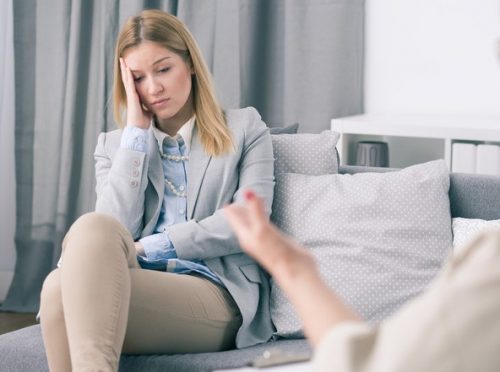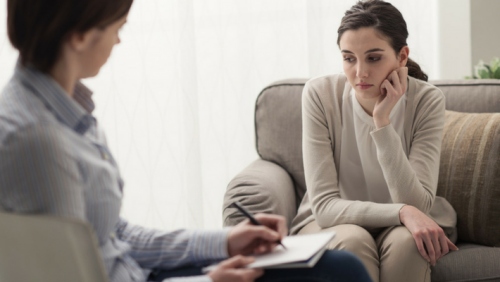First therapy sessions, no matter what type, often evoke mixed emotions, don’t they? Many people, including elders and professionals, feel nervous and anxious before their initial meeting with their therapists or mental health professionals in the first counseling appointment. In fact, individuals facing physical or mental health issues may avoid seeking therapy due to the presence of a stranger and sometimes even resist seeking professional medical advice. Finding the right therapist and taking the time to work through these feelings is crucial for personal growth and well-being.

Thankfully, subsequent visits become less tense and more open and relaxed. What do you expect during your first treatment? What can you do to feel comfortable?
First Therapy Session Anxiety
According to Robert Allison, MA, LPC, “Anxiety sees too many things as threats, it sees threats too easily. As a result, fight or flight response is triggered too often and too easily.” It’s normal for people who will undergo their first therapy appointment to feel tense before it starts. The primary question they ask is, “How many sessions will this type of counseling have?” They struggle with difficult emotions and know there isn’t a quick fix for one’s mental health issues so the first session would only be the first session of many therapy sessions to follow. Their own thoughts are increasing stress and anxiety in the waiting room. People are also anxious about how their therapist is going to deal with them. They try to choose among potential therapists in their area. Of course, we all want to feel comfortable during treatment sessions and for our treatment process to go smoothly.
Many mental health professionals, on the other hand, are aware of this and are doing their best to bring down barriers between them and their patients during the first visit. Most probably, you are there but already you feel like backing out from a paid and scheduled therapy session. Don’t give up just yet if you feel that your initial therapy session won’t go well. Don’t succumb to the feeling of pressure and negative thoughts – it’ll only worsen your mental health issues. Don’t feel nervous that you’ll be judged – you won’t, if you have chosen a good mental health professional.
Professional associations and medical reviewers guarantee that even if you attend only a few meetings or few sessions of any type of therapy, an example of which is online counseling or existential therapy, you will already acquire significant medical advice diagnosis, support, and other related services. In addition, a person or client who feels prepared will be able to determine his childhood feelings better. He will also receive his intended advice on diagnosis or treatment with confidentiality, which is helpful if he can’t stay for too long.
What To Expect
Your initial therapy session is usually the hardest. Expect to be asked personal questions (that’s the protocol for new patients). This is done by a mental health professional so that they can come up with a suitable plan to manage your specific concerns and how to help in reducing symptoms that you may have. Don’t worry – this is totally normal when you’re starting therapy sessions. Of course, initial paperwork is drawn during your first therapy appointment, wherein all information regarding your mental illness or other mental health problems is recorded as well as the signs you need therapy. Most mental health professionals will give you realistic expectations about your treatment.

In the next appointment, your chosen mental health professional will encourage you to do a lot of talking during the treatment. The therapist will expect you to answer everything truthfully, if not exhaustively. This will be for your own well-being, so honesty is essential throughout the entire session. If you are uncertain about starting therapy or the type of therapy that would suit you best, don’t hesitate to find a therapist who can guide you in the right direction.
Expect your counselor to delve into your family history, your mental illness, and the root cause of why you are starting counseling. Is it mainly for improved mental health or is it that you want to ask your counselor about coping strategies for certain life challenges? This may make you feel uncomfortable, especially during your first session. But it’s okay if you don’t feel like disclosing everything about yourself. Julie Simon, PsyD once stated that “While therapy can be challenging, it can also be the catalyst that allows you to live a more fulfilled and peaceful life.” Eventually, you have to decide to cooperate with your therapist. After all, successful therapy entails engaging in a two-way street approach.
The first appointment is an ice-breaker. Before, patients were made to lie on a divan and stare at the ceiling during their counseling sessions. Now, you will instead be made to sit on a comfortable couch. The room will be relaxing, as it is designed to give the appearance and vibe of a simple living room instead of a typical doctor’s office. The modern therapist’s office should make your first session encouraging.
What To Do On Your Initial Counseling

Keep in mind that you are probably not the only patient of your mental health professional who came to seek help for your mental health. He or she has heard a lot of stories from different people. He or she is definitely not there to listen to you and judge you afterward. Noah Rubinstein, LMFT, LMHC often says, “A good therapist should be open and willing to understand your concerns. If your therapist doesn’t take your concerns seriously or is unwilling to accept feedback, then it’s probably in your best interest to consult with another therapist about it.” Yes, you can always learn how to switch therapists or mental health professionals if you wish – for the sake of your mental health.
Here’s what you should do: For a while, try picturing what a typical therapy session would look like so you wouldn’t get surprised by what goes on after the mental health professional welcomes you into the room. This may shake off your anxiety as you would come to the session with an idea of what exactly would happen.
Before the session, you can also remind yourself of certain personal relationships, history, and painful memories, but always be prepared to tell the truth about the reasons why you are seeking help, including advice on diagnosing anxiety disorders. Convince yourself not to mask any past experiences that will be significant to your counselor in helping you.
This way, you can also brush off all the false thoughts that ‘therapists would make you revisit your painful memories right away during the first meeting.’ The most important thing for you to think about to ease your anxiety is that everything you will talk about with your therapist is kept confidential.
Initial Counseling Consultation
It’s okay to be skeptical in the beginning. Therapists are also doing their best to make you feel the most comfortable during each session. Scheduling an initial therapy session is better than just sulking in your room and asking yourself when you can move on from your depression.
The immediate goal of every meeting is for you to open up and start moving toward your healing. Moreover, finding a good fit with a therapist who specializes in various types of therapy, including online therapy, is crucial. A good therapist knows the ethics and the best techniques to build rapport right before the initial meeting concludes. So, don’t wait; book an appointment now and begin your emotional and mental training.
Frequently Asked Questions
What Do Individuals Do On Your Very Initial Counseling Session?
During the first therapy session, the American Psychological Association recommends that the therapist will be asking you a number of questions—questions about yourself, how you handle things, and maybe some signs or symptoms you are currently experiencing. Finding a therapist who is a good fit for you is essential, and this initial meeting would be like an interview to get to know you better. Through this process, your therapist will better understand your expectations and the goals you have for your counseling sessions.
What Do You Say During Your First Therapy Session?
-
- You start by introducing yourself. Tell the therapist your reasons why you are currently seeking therapy.
- you can also ask your therapist about their experience and different types of approaches when dealing with patients.
- Share your time availability for sessions, and also you can ask about their schedule availability as well.
- You can also take this chance to clarify the costs, insurance options, and modes of payment, and also cancellation policies.
Will My Initial Counseling Session Be Awkward?
How Do I Prepare For My Initial Counseling Appointment?
Do Counselors Think About Me Between Our Sessions?
What questions do therapists ask?
How do you feel after your first therapy session?
What do therapists do for anxiety?
What questions should I ask a new therapist on my first session?
Is my initial therapy appointment enough?
Is the initial therapy appointment the hardest?
Is it okay to cry in my 1st ever session?
What should I not tell my therapist?
Are therapists allowed to hug?
Do therapists look at clients’ social media?